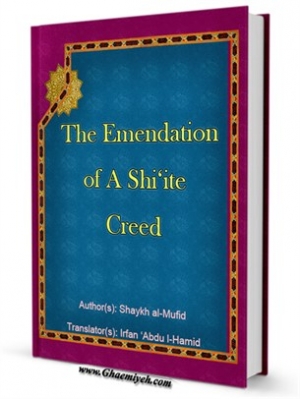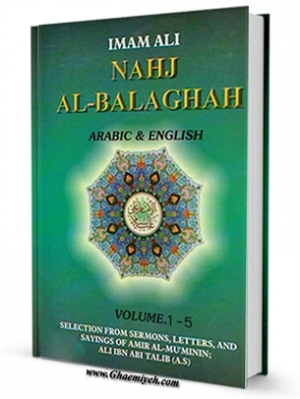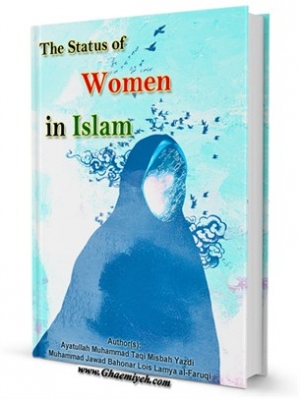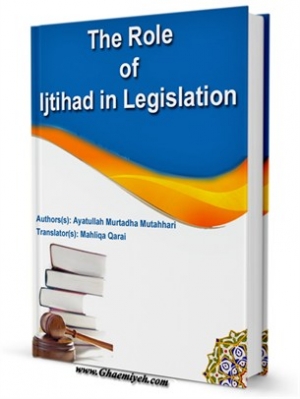Super User
The Emendation of A Shi‘ite Creed
Book introduction
This book is written by Shaykh al-Mufid and translated into English by Irfan ‘Abdu l-Hamid. Its publisher is World Organization for Islamic Services.
The intellectual relationship between the Mu‘tazilite school of thought and Shi‘ism, which constitutes, as the late Prof. Macdonald noticed, "the great mystery of Muslim history", was referred to by many classical as well as modern scholars. The different opinions expressed by them on this complicated subject can be reduced to two theories.
Those who maintain that Shi‘ism has elaborated its theology on a basis borrowed from the intellectual system of the Mu‘tazilites, to which the Shi‘ah divines affiliated themselves during the fourth century of the Hijra. This theory seems to be very old in origin, since as early as the fourth century some, such as ash-Shaykh al-Mufid, wrote a refutation of it. Among the Sunnite theologians ash-Shahrastani, lbn Taymiyyah and ad-Dawani supported it. Recently both Goldziher and Adam Mez have also championed it.
Contrary to this is the theory advanced by the Shi‘ite theologians themselves who resented the whole aspersion of borrowing, and were engaged in intellectual controversies in an effort to repudiate it, directing their fiercest attacks against this so-called "false allegation". They were not content with this negative refutation but also alleged that the whole Mu‘tazilite system was itself a product of the teachings of the infallible Imams, which were transfused into Mu‘tazilite philosophy through the tuition which the early Mu‘tazilite doctor, and the founder of the whole school, Wasil ibn ‘Ata’ received from Muhammad Ibn al-Hanafiyyah. (1)
It is easy in this respect to explain and comprehend the concern of the Shi‘ah divines on the grounds that to them the whole structure of their authoritative system was based on and indeed derived from the direct intuition which the infallible received from God without any extraneous support.
Nevertheless, a critical investigation based on comparative research will soon disclose that the transformation of the Shi‘ite theology from a literal, traditional stand to a rational and allegorical interpretation of the revealed law, was primarily inspired by critical and rational Mu‘tazilite tendencies.
I am convinced that a critical comparison of the Imamiyyah Creed as stated for the first time by Ibn Babawayh al- Qummi in his ‘Aqaidu 'l-Imamiyyah, with Tashih I‘tiqadati 'l- Imamiyyah which was compiled by his pupil Abu ‘Abdillah ash-Shaykh al-Mufid, which is the core of my thesis, will demonstrate that the reconstruction, refinement and reexamination which is visible in al-Mufid's work, marked a new orientation towards a critical methodology first inaugurated by the Mu‘tazilite. Hence it is essential that my work should be studied along with Prof. A.A.A. Fyzee's A Shi‘ite Creed.
My thesis, as it stands, consists of three parts. In Part One, I have dealt with the author, his works and the times in which he lived, since it is my opinion that the Buwayhid regime in which he lived, provided a milieu in which Mu‘tazilite teachings permeated Shi‘ite theology. I have prepared a complete list of his works, published, extant in manuscript, and unknown to us except by name, to show the position which he enjoyed and the important role he played in Shi‘ite thought. I was very lucky in my visit to an-Najaf, al-Kazimayn and Karbala’, where I found many valuable manuscripts not recorded in the standard catalogues.
In Part Two I have prepared a critical translation of Tashih I‘tiqadati 'l-Imamiyyah, with amendments and notes. I have based my translation on the published text which is based in turn on three different manuscripts. I have made use of a fourth copy which exists at the India Office Library under the number 2057.
I have referred to them respectively by the letters (T) for the published text, and (N) for the India Office manuscript. In Part Three, I have commented on a selection of topics relevant to my thesis. In some cases detailed and somewhat lengthy explanations were unavoidable so that the different stands of the various schools should be made clear and their inter-relations and mutual impact easily discerned. Three general observations also are to be noticed:
a) I have restricted my research to the intellectual relationship between the Mu‘tazilite school of thought and the Ithna‘Ashariyyah school of the Shi‘ah; thus wherever the word Shi‘ah is used generally, they are meant by it.
b) Since this thesis deals with controversial subjects and terminology, it was very difficult to rely only on one of the approved translations of the Qur’an; consequently I have made use of all the standard translations.
The Faith of the Imamiyyah Shi'ah
Book introduction
The faith of Imamiyyah
This is an Arabic book in the faith of Islam from the shitte view. Mr.Mozaffar had presented the contents of this book in the college of "Monta-dannashr" in 1943. The he published it with this name and also "Aqayedoshia" and his precious goal was unity between the Islamic sects.
Structure of the book
The present book contains the biography of the author written by Mohammad Mahdi Asefi, a preface from Dr.Hamed Hanafi Dawud, and a preface by the author and five seasons.
Contents
The faith of Imamiyyah is a collection of Islamic beliefs based on shitte thought and was organized in a short and fluent style. In contrast to prior ideological books, it is free of any difficulty to understand and it is understandable for everyone.
The author states in the preface of the book the beliefs of shia about epistemology, imitation in actions, Ijtehad and mojtahed.
The first season is about shitte theology including following topics:
Shitte belief about God, monotheism, characteristics of God, justice, duty, destiny and Bada.
In the second season by the title of prophecy argues the following topics:
Shitte belief about prophecy, blessing of prophecy, shitte beliefs about prophet's miracles, infallibility of prophets, characteristics of prophet Mohammad, shitte belief about other prophets and their books, shitte belief about Islam and lawmaker of it, and belief of Imamiyyah about Quran.
In the third season by the title of Imamate states the following topics: shitte belief about imamate, infallibility of Imam, characteristics and knowledge of Imam, necessity of obedience of Imams, passion of Ahlelbayt, infallible Imams, number of Imams, Imam Mahdi (A.S), Rajat, and Taghiya.
In the fourth season the author mentions mores that Imams taught Shia. The following topics are available:
Belief of Shia about praying, praying in Sahife Sajjadiyah, visiting dead, meaning of Shia in viewpoint of Ahlelbayt, offense, cooperating with oppressors.
The fifth season is about hereafter and states the shitte belief about hereafter and resurrection day and physical return.
This book is described by Ayatollah Mohsen Kharrazi and published by the title of " Almarafeol elahiye fi sharhe aqaedel imamiyah" in two volumes.
The invaluable legacy of the Household [Ahl al-Bayt] of the Prophet (may peace be upon them all), as preserved by their followers, is a comprehensive school of thought that embraces all branches of Islamic knowledge. This school has produced many brilliant scholars who have drawn inspiration from this rich and pure resource.
It has given many scholars to the ummah [Muslim community] who, following in the footsteps of Imāms of the Prophet’s Household (‘a), have done their best to clear up the doubts raised by various creeds and currents within and without Muslim society and to answer their questions. Throughout the past centuries, they have given well-reasoned answers and clarifications concerning these questions and doubts.
To meet the responsibilities assigned to it, the Ahl al-Bayt World Assembly (ABWA) has embarked on a defense of the sanctity of the Islamic message and its verities, often obscured by the partisans of various sects and creeds as well as by currents hostile to Islam. The Assembly follows in the footsteps of the Ahl al-Bayt (‘a) and the disciples of their school of thought in its readiness to confront these challenges and tries to be on the frontline in consonance with the demands of every age.
The arguments contained in the works of the scholars belonging to the School of the Ahl al-Bayt (‘a) are of unique significance. That is because they are based on genuine scholarship and appeal to reason, and avoid prejudice and bias. These arguments address scholars and thinkers in a manner that appeals to healthy minds and wholesome human nature.
To assist the seekers of truth, the Ahl al-Bayt World Assembly has endeavored to present a new phase of these arguments contained in the studies and translations of the works of contemporary Shī‘ah writers and those who have embraced this sublime school of thought through divine blessing.
The Assembly is also engaged in edition and publication of the valuable works of leading Shi’ah scholars of earlier ages to assist the seekers of the truth in discovering the truths which the School of the Prophet’s Household (‘a) has offered to the entire world.
The Ahl al-Bayt World Assembly looks forward to benefitting from the opinions of the readers and their suggestions and constructive criticism in this area.
This book can best be described as an inquiry of an explorer of the truth into the delicate yet essential question of: “Who is better qualified to the claim of being a follower of Islam's Prophet in spirit and in practice?” Just as it is mandatory to follow the Qur'an, it is equally essential to follow the Prophet, peace be upon him. While the Qur'an is the Almighty's revelation, the Prophet's statements and actions, without any doubt, are also guided by the Almighty, and he cannot err:
“Nor does he speak out of desire. It is naught but revelation that is revealed” (Qur'an, 53:3-4),
hence the importance of taking the Sunnah (the Prophet's traditions and statements) very seriously.
Both major schools of Islamic law, the Sunni and the Shi`a, differed with regard to the important issue of the spiritual as well as the temporal succession of the Prophet of Islam. This difference resulted in the Muslims' ideological division after the Prophet's death. Here is an interesting fact for your consideration:
Both Sunni and Shi`a groups agree all along with regard to the importance of the Qur'an and of the Sunnah, accepting them as the bases upon which they establish the implementation of their faith. Despite this fact, however, the Sunnis arrogated to themselves the title of “Ahlul Sunnah,” or “the people of the Path,” and the rest of the world passively gave in to this assumption and accepted it as a fact.
In his Dictionary of Islam, Thomas Hughes(1) points out: “... hence it comes to pass that although the Shi`as, even to a greater degree than the Sunnis, rest their claims upon traditional evidence, they have allowed their opponents to claim the title of traditionists, and consequently Mr. Sale(2) and many European writers have stated that the Shi`as reject the tradition.”
In our times, the freedom of thought and expression, coupled with a spirit of independent inquiry, has helped men and women to free themselves from misbeliefs, whims, and superstitions.
Amazingly, the distinct task of separating the truth from the myth on an issue of such a great importance, namely the question of who the genuine followers of the Sunnah of the Prophet are and who followed in his footsteps__Ali and his friends, or the sahaba (the friends of the Prophet) who opposed the Prophet's cousin after his death__had to be pioneered by the author of this book who grew up as a Sunni.
After several years of independent inquiry as to who was right__Ali or his opponents__he gave up the beliefs of his ancestors and accepted the Twelve Imams of the Shi`as as his “rightly guided” leaders after the Prophet. The author of four previously published books (Pyam-e-Aman had published the English translation of his first book titled Then I was Guided), Dr. Muhammad al-Samawi al-Tijani is a great scholar and Arabist.
As a student of comparative religion, he has tirelessly pursued his quest for the truth, and he continues to write what he calls, in the beginning of his first book, “a story of a journey..., a story of a new discovery... in the field of religious and philosophical schools.”
The question of who Ahlul Sunnah are and who are not is critical to any believer, both in the context of history as well as in the practice of religion today. It is also important because those who labelled themselves as the “traditionists” viewed all others as “heterodox” in contrast to their claiming themselves to be the “orthodox.”
This resulted in violence and coercion as the rulers of the time used such accusations to oppress the masses as they demonstrated their power and ruthless control over their destiny. Western Islamists picked up the jargon from the writers of the “majority sect” and divided the Muslim world in their writings into “Orthodox” and “Heretical,” referring to the Sunnis and the Shi`as respectively.(1)
This hypothetical dichotomy is misleading and completely baseless. It is also due to the lack of understanding about the world of Islam. Western writers fail to observe that, other than the belief in the issue of Imamate, the Sunnis have far greater differences within their own four sects (or schools of thought) system compared to their differences with the Shi`as.
The views of the Hanafis regarding theological questions, for example, may well coincide with those of the Shi`as while remaining in an uncompromising contradiction to many doctrines espoused by, say, the Hanbalis, the Shafi`is, or the Malikis.
In sharp contrast to the evidence of “irreconcilable differences” between the four Imams who had established the afore-mentioned Schools of Sunni Thought, even with regard to issues of minor as well as major importance, a total consensus exists among the Twelve Imams of Ahlul Bayt (People of the Prophet's House) on each and every doctrinal aspect of the faith.
In his celebrated treatise titled Kitab al-milal wal nihal (the book of religions and religious sects), al-Shahristani,(1) a Muslim thinker who lived during the Medieval times, gives an account of the Muslim sects (firaq, singular: firqa) and their disagreements on four fundamental issues: Tawhid (Oneness of God and His Divine Attributes), Adl (justice), Iman (faith or conviction), and lastly Revelation, the Prophetic mission, and the right to be the leader (Imam) of the Muslim community.
A revealing picture that emerges from his work shows that, unlike the usual European concept of a religious sect, the Muslim firaq, with their different views on issues, allow a dialogue between scholars and followers of different theological persuasions. This offers hope that in the new “information era,” with people coming closer to and eager to communicate with one another and ready to adapt to change, the Muslim world may achieve its homogeneous synthesis, notwithstanding the minor variants, in a not too distant future, Insha-Allah.
Al-Sahifa al-Sajjadiyya is a book of supplications attributed to Ali ibn Husayn Zayn al-Abidin, the great-grandson of the Islamic Prophet Muhammad. According to Shia narrations, the book is said to have been composed after the Battle of Karbala (680 AD) and describes the relationship between man and God. Although the book is principally a collection of Islamic knowledge and thought in supplication form, it is said to have played an important part in the uprising against the Umayyads. According to some scholars, al-Sahifa al-Sajjadiyya is an example of the highest form of eloquence, and its contents have been described and explained in many books of commentary. The main part of the book is mutawatir (conveyed by successive narration), but over the years a number of scholars have written addenda to it. Al-Sahifa al-Sajjadiyya is an important book for Shia Muslims.
Al-Sahifa al-Sajjadiyya has several titles, such as "Sister of the Quran", "Gospel of the Holy Household" and "Psalms of the Muhammad dynasty", names which clearly indicate the importance of the book for Shia Islam. In the form of supplication, it expresses Islamic knowledge and thought and involves all aspects of individual, social, economical, political and cultural life. Reason, human feelings, emotions and conscience are all addressed by it.
Shia narration states that Sajjad composed al-Sahifa al-Sajjadiyya after the Battle of Karbala (680 AD). According to some researchers, circumstances at the time of the Umayyad Caliphate did not allow Imam Sajjad to speak explicitly and unambiguously. Not only did the regime not permit it, but the public, too, were unwilling to listen to his words. Shia narrations state Imam Sajjad therefore used rich and meaningful supplications to reconstruct society and distribute Islamic knowledge. It seems al-Sahifa al-Sajjadiyya -which was protected from government agents by Imam Sajjad’s sons and companions- was a sectarian and organisational booklet, which the access of the government agents to it make ineffective all Imam Sajjad's efforts.
Many scholars see al-Sahifa al-Sajjadiyya as teaching theology in a personal and practical way, not in abstract language, and as indicating the relation between man and god in a way that can be universally understood. However, the book is not merely a conversation with God; in supplication form, it is also a collection of Islamic knowledge and thought. It emphasizes detachment from the material world, and addresses many moral and ethical issues. According to some scholars, al-Sahifa al-Sajjadiyya exhibits the highest level of eloquence and purity to be found in Arabic literature after the Quran and the Nahj al-Balagha of Ali, cousin and son-in-law of Muhammad.
View of prominent Christian figures
Philip Woolley, a professor and researcher from Germany, asked for a copy of al-Sahifa al-Sajjadiyya to be sent to him after his friend, a Roman Catholic Cardinal, saw the book in his library, studied part of it, and impressed with its novelty insisted on taking it away with him. When the Vatican Library in Rome received an English version of al-Sahifa al-Sajjadiyya, it said in its letter of acknowledgment: "This book contains great mystical themes, so we place it for researchers in the best position of the library." A leader of Germany's Social Democratic Party wrote to a friend, Professor Singler, saying: "This book had a profound impact on me and changed my view about Islam. I invite my friend to study this book", while in Poland, Christian Scientist Andre Kowski said of the book: "I am deeply impressed by the ideas of Imam Sajjad, whose noble thoughts are manifested on the pages of the book al-Sahifa al-Sajjadiyya. It is so attractive, to the extent that I feel this book has given me a complete sense of the mystical and divine."
"The Source Of Rights" is an article written by Ayatullah Muhammad Taqi Misbah Yazdi, And published by Ahlul Bayt World Assembly. It is a philosophical discussion on the origin of rights; that it's source is the will of Allah.
The subject of our discussion is the origin of ‘rights’. Before entering into discussion of the subject matter it is essential to explain the meaning of right and its usage.
Right, justice and its synonyms are the most sacrosanct words, which enjoy highest sanctity and special elegance of meaning in all the human societies. One can hardly come across a person who would like to introduce himself as the supporter of falsehood and oppression and oppression and opposed to justice and the right. The most tyrant persons and governments proclaim to be true and just in order to deceive the people. They want to cover the ugliness of their aggressive tyrant deeds under the beautiful mantle of justice and truth. The affinity of these two meanings becomes clearer when justice is defined as dispensation of right to the rightful.
The search for truth and justice is considered as the mother of all social values. The precept of virtue of right and justice is an evident rational dictum. Inclination and ambition for these are considered as a part of man’s lofty temperament. So is the precept of vices of oppression and fallacy an evident rational dictum. Dislike for these is also a part of human nature.
Islamic culture also attaches significant importance to these terms. These have repeatedly been referred to in the Holy Qur'an and the sayings of the holy Prophet (S) and the members of his household, the Ahlul Bayt (A.S.) which indicates the importance of this matter in the system of Islamic values.
Let us however, impress upon the fact that the word right has various usages but all of these do not relate to our subject matter. For instance, the word right means permanent being, or the statement according to facts or a promise about something, which would certainly happen, etc.
Therefore, truth in relation to Almighty Allah (S.w.T.) also does not relate to our subject matter. If the search for justice and right is part of human nature it cannot be related to acquaintance and worship of Allah (S.w.T.) and the existence of one cannot be derived from the other. Some have tried to do so to arrive to such conclusions but they have only confused between its ethical meanings and philosophical conception.
The other point is that the limitations for usage of right in legal discussions is much narrower than its expanded use in ethical and religious discourses, discussions are held on the ‘rights’ of Allah (S.w.T.) over man and even the ‘rights’ of man over Allah (S.w.T.). But as far as the legal concept is concerned it exclusively relates to the relationship between man and man. On the other hand, the word ‘‘rights’’ is used in at least two different meanings as far as its usage by the lawyers is concerned. The one relates to reservations and privileges granted to individuals or groups of persons, which should be honored by others and should not be violated or encroached upon by any one.
The other meaning is the code of laws whose observance is obligatory. These may provide privileges for certain persons or prescribe obligations for others. These can also be laws describing conditions and qualifications, such as explaining the conditions for the correctness of agreements and contracts. The word ‘rights’ in the second sense is very much similar to the term ‘social laws’.
However, these two meanings are not entirely alienated to each other, because all legal laws are connected in one way or the other with the rights of individuals or the society. If it grants a right to somebody it necessitates an obligation for the opposite side. In case it provides obligations for all it would mean provision of reciprocal duties for all. As a result of this every one will have a reciprocal right on the other. As a matter of fact, such general laws are dissolved into minor laws each of which guarantee a special right or obligation.
To put this in one sentence, it can be said that ‘rights’ and duties are interrelated and the enactment of one necessitates the provision of the other.
Similarly, the enactment of laws such as those providing details and conditions for entering into agreements and contracts and similar other laws provide both ‘rights’ and duties accruing from such agreements and contracts.
The Nahj al-Balagha (Arabic: نهج البلاغة Nahj-ul Balāgha(h), Arabic pronunciation: [ˈnahdʒul baˈlaːɣa]; "The Peak of Eloquence") is the most famous collection of sermons, letters, tafsirs and narrations attributed to Imam Ali , cousin and son-in-law of Muhammad. It was collected by Sharif Razi, a Shi'i scholar in the Tenth century (fourth century AH) Known for its eloquent content, it is considered a masterpiece of literature in Shi'i Islam.
Nahj al-Balaghah comprises various issues that cover major problems of metaphysics, theology, fiqh, tafsir, hadith, prophetology, imamate, ethics, social philosophy, history, politics, administration, civics, science, rhetoric, poetry, and literature. The book not only reflects the spirit of early Islam and the teachings of the Qur'an and the Islamic prophet Muhammad, but also serves as a guide to traverse the future in the light of these teachings.
Nahj al Balagha is a collection of 241 sermons, 79 letters, and 489 utterances. As per each new publishing versus past volumes, the number of sermons, letters and utterances has varied from 238 to 241, 77 to 79, and 463 to 489, respectively.
The book narrates from Ali on a wide variety of topics, ranging from the creation of the World, the creation of Adam, end of the Universe and the arrival of Imam al-Mahdi.
Knowledge of the creation in general, and of this World in particular, is emphasized by Ali ibn Abi Talib in the Nahj al-Balaghah as a prerequisite for making use of freedom in the right direction and for the purpose willed by God. Knowledge, if used properly, helps man in winning God's favour and bartering his deeds with Divine Will, as the Qur'an declares:
And among men is he who sells his self for seeking the pleasures of Allah. . .. (al-Baqarah: 207)
Those who attain such a stage are few, and as many mufassirun point out Ali as one of those chosen few who bartered his self with Divine Will, according to the interpretation of this Qur'anic verse. When human will becomes one with Divine Will, man attains the highest stage of freedom: now there is no compulsion, and whatever a man wills or does is in conformity with what God wills and wants man to do. Rightly guided knowledge helps in attaining this stage.
After expressing his view on human freedom, Imam Ali proceeds to highlight the value and importance of knowledge. We find after the saying 78 about freedom, his views about knowledge and wisdom in the saying 79, or in his saying 130 we come across his views on the significance of acquiring knowledge and contemplating the signs observable in the World after his description of the World as the best place for making proper use of human freedom. Knowledge is held by Ali to be the light of reason, a treasure, the root of all good, and that which emancipates man; it is a power (saying: 146), and one's supremacy is in proportion to the extent of one's knowledge and wisdom (Sayings: 175).
From his many sayings about knowledge it may be rightly inferred that knowledge is itself freedom, for it saves man from ignorance, which is the cause of man's slavery to false beliefs, unfounded fear of nature and his superiors. It is at the same time a key to attain and safeguard freedom accorded to human beings. The Holy Qur'an is unique among the scriptures in encouraging the believers to acquire knowledge and to verify the fundamentals of faith rationally. There are 704 verses in the Qur'an where the word 'ilm or its derivations are used. Book, an essential aid of 'ilm occurs in the Qur'an 230 times, while the total number of verses in which words related to kitab and kataba have occurred is 319. The Qur'an itself is mentioned as kitab on 81 occasions in its text. It is not possible in this brief article to quote even a few of the relevant Qur'anic verses and the sayings of Ali. However, it would not be out of place to point out that the right to acquire knowledge and freedom of enquiry forms an essential part of the laws and guiding principles governing human rights in Islam. In this matter, no distinction is made between Islamic and non-Islamic sources and Muslim and non-Muslim teachers. Ali says:
"Acquire knowledge and truth from whomever you can, because even an apostate can have them, but unless they are passed over to a faithful Muslim and become part of wisdom and truth that he possesses, they have a confused existence in the minds of apostates." (Sayings: 79).
Another saying of Ali an elaboration of the Prophet's famous tradition, according to which knowledge is the lost property of Muslims:
"A wise saying is a lost and long-sought article of the believer. Therefore, acquire it even if it is to be found with hypocrites". (Sayings: 80).
The right to acquire knowledge has been always accorded to non-Muslims also in Muslim States. An important point made by Ali is as to how an infidel uses knowledge, which remains in a confused state in his mind.
Being fully aware of the dangers of the abuse of knowledge, Ali claims that God will always appoint some Imam as the guardian of Divine revelation and he, openly or hidden from the eyes of the World, will guide men till the end of this World. (Saying 146 addressed to Kumayl)
This book is authored by Ayatullah Muhammad Taqi Misbah Yazdi and published by International Relations Department, Islamic Propagation Organization, Iran.
This book is in fact the first article of Ayatollah Subhani which was written for the first time in "Maktab Tashayyo" magazine and later on it was published by "Azadi" publication in Qom with 5000 copies.
The author at first argues the status of woman in Islam and continues his writing by answering the questions and doubts about the rights of woman in Islam. In this book the author believes that the basic solution for solving social problems is the logic of the nature (Fetrat) and then mentions the differences between the nature of men and women and surveys the distinctions of women in contrast to men and at the end states the status of woman in Islam. As well Ayatollah Subhani compares the Islamic and western attitudes about woman's rights and mentions the supremacy of Islamic culture in this case.
This booklet is written by Sayyid Muhammad Rizvi and it is published by Vancouver Islamic Educational Foundation. It is an important guide for Muslims explaining the rules and spiritual significance of Najasat and Taharat, Wudu, Ghusl and Tayammum.
The author in the preface explains his attitude of this booklet as following:
In 1984 I published a series known as `The Laws of the Shari'ah' which included booklets on The Tendency of Rationalizing the Shari`ah Laws, Ijtihad, Taqlid, Taharat Najasat, Wudu Ghusl, and Khums. The books were very well received by the readers in various parts of the world, al-hamdu li ' l-lah. Imam Mahdi Association of Bombay has translated the first three booklets in Urdu and is using it as a text in its study circle programs.
In 1987 when the time for the third printing of Taharat Najasat and Wudu Ghusl came, I decided to combine the two into one. But while combining, I thought of rewriting the two booklets and add some more discussions in them. But the rewriting was put off because of my studies and various other activities. Finally, this year Allah blessed me with an opportunity to rewrite and finalize this book, and the result is what you see in your hands.
The booklets Taharat Najasat and Wudu Ghusl were just simple explanations of the rules of ritual purity in Islam. In this book, I have extensively quoted the relevant Qur'anic verses and the ahadith. Moreover, I have added two new discussions: a section on “Our Outlook Towards the Najasat” which deals with an issue which is very important for the Muslims living in a non-Muslim society, and a chapter “From Ritual to Spiritual” which attempts to relate the ritual purification to the spiritual purification.
This chapter is in response to a need which I observed in the Muslim communities of various places with whom I have been working during the last seven years. Fortunately, the rituals are practiced by many; but unfortunately they are considered as just ritual and nothing more. I think it is very essential for the Muslims to know how to utilize the daily rituals of taharat, wudu, ghusl and salat for their spiritual upliftment.
The new chapter could still be expanded by including the spiritual significance of the daily prayers, an issue which I discussed in twelve lectures during the Muharram of this year. But in this book I wanted to confine myself to the spiritual purification that was relevant to the ritual purifications. And so I left the other aspects of spiritualism for some future work, insha Allah.
I hope the readers will find this new chapter informative and useful; and I would specially like to urge the leaders of the Muslim organizations in the West to read this chapter and try to implement its teachings in the way they think, behave and deal with the people.
This is an article of Ayatullah Murtadha Mutahhari. It is translated into English by Mahliqa Qarai.
The terms 'mujtahid' and 'ijtihad' are nowadays among those which have acquired great currency, even sanctity, among the Shi'ah. One would be surprised to know that the term ijtihad was formerly, from the times of the Prophet (S) and for several successive centuries, a Sunni term. It became Shia after undergoing a change of meaning, or what would be more precise to say, the term remained specifically Sunni for several centuries and became 'Muslim', in the wider sense, that is, after undergoing a change of meaning and dissociating itself from its earlier particular sense.
As to its not being a Shi'a term formerly, there is no doubt; if there is any uncertainty, it is about the date of its acceptance by the Shi'ah. It is not improbable that this term like several groups of people in the seventh century was converted to Shi'ism at the hands of the absolute Ayatullah, al-'Allamah al-Hilli. However, as we shall presently explain, the conversion came after its undergoing a change of meaning.
Apparently, there seems to be no doubt that this term was never used by any of the Imams of the Ahl al-Bayt (A). The terms ijtihad and mujtahid, in the sense in which they are used by Shi'ah and Sunni fuqaha', have not been used in any of their ahadith. Neither they themselves were ever known by the epithet 'mujtahid' nor did they ever use it for the scholars and legists from among their companions. Otherwise the root relating to such terms as fatwa and ifta, which convey approximately the modern sense of ijtihad, and its derivatives do occur in the ahadith. For instance, al-'Imam al-Baqir (A) is reported to have said to Aban ibn Taghlib:
Sit in the mosque of al-Madinah and give fatwas for the people . Indeed I love more like you to be seen amongst my Shi'ah.
And in a famous hadith, al-'Imam al-Sadiq (A) is reported to have said to 'Unwan al-Basri:
Avoid giving fatwa in the way you would run away from a lion; do not make your neck a bridge for the people.
The reason for the former unpopularity of the word is that during the early centuries of the Islamic era - that is also the period in which the Imams of the Ahl al-Bayt (A) lived - the word, due to the specific meaning it carried, was not acceptable to the Imams (A). Naturally, it could not have played any role in their teachings. However, after undergoing a gradual change of meaning, when it came to be used in a different sense by Sunni fuqaha' themselves, it was also adopted by Shi'ite fiqh. Now we shall briefly describe the background of the Sunni usage of this term.













